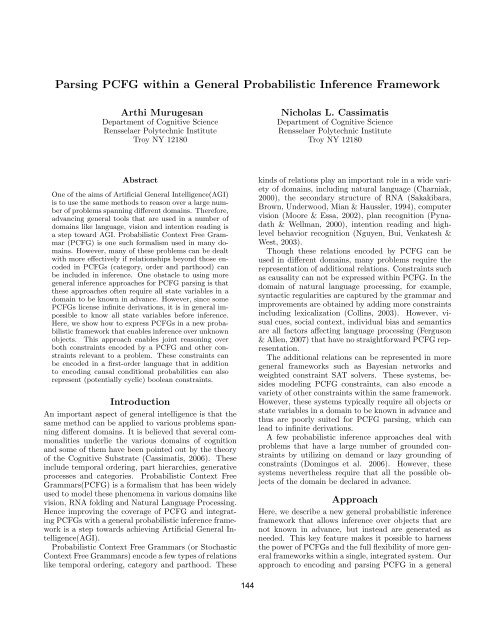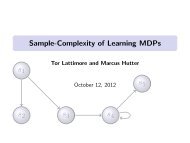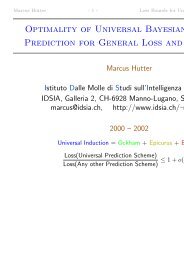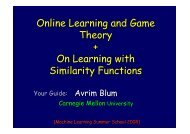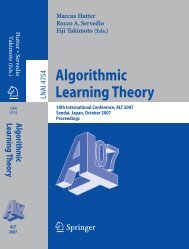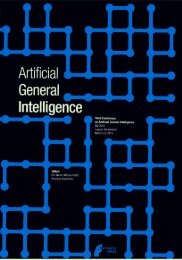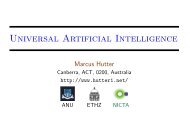A Framework for Evaluating Early-Stage Human - of Marcus Hutter
A Framework for Evaluating Early-Stage Human - of Marcus Hutter
A Framework for Evaluating Early-Stage Human - of Marcus Hutter
You also want an ePaper? Increase the reach of your titles
YUMPU automatically turns print PDFs into web optimized ePapers that Google loves.
Parsing PCFG within a General Probabilistic Inference <strong>Framework</strong><br />
Arthi Murugesan<br />
Department <strong>of</strong> Cognitive Science<br />
Rensselaer Polytechnic Institute<br />
Troy NY 12180<br />
Abstract<br />
One <strong>of</strong> the aims <strong>of</strong> Artificial General Intelligence(AGI)<br />
is to use the same methods to reason over a large number<br />
<strong>of</strong> problems spanning different domains. There<strong>for</strong>e,<br />
advancing general tools that are used in a number <strong>of</strong><br />
domains like language, vision and intention reading is<br />
a step toward AGI. Probabilistic Context Free Grammar<br />
(PCFG) is one such <strong>for</strong>malism used in many domains.<br />
However, many <strong>of</strong> these problems can be dealt<br />
with more effectively if relationships beyond those encoded<br />
in PCFGs (category, order and parthood) can<br />
be included in inference. One obstacle to using more<br />
general inference approaches <strong>for</strong> PCFG parsing is that<br />
these approaches <strong>of</strong>ten require all state variables in a<br />
domain to be known in advance. However, since some<br />
PCFGs license infinite derivations, it is in general impossible<br />
to know all state variables be<strong>for</strong>e inference.<br />
Here, we show how to express PCFGs in a new probabilistic<br />
framework that enables inference over unknown<br />
objects. This approach enables joint reasoning over<br />
both constraints encoded by a PCFG and other constraints<br />
relevant to a problem. These constraints can<br />
be encoded in a first-order language that in addition<br />
to encoding causal conditional probabilities can also<br />
represent (potentially cyclic) boolean constraints.<br />
Introduction<br />
An important aspect <strong>of</strong> general intelligence is that the<br />
same method can be applied to various problems spanning<br />
different domains. It is believed that several commonalities<br />
underlie the various domains <strong>of</strong> cognition<br />
and some <strong>of</strong> them have been pointed out by the theory<br />
<strong>of</strong> the Cognitive Substrate (Cassimatis, 2006). These<br />
include temporal ordering, part hierarchies, generative<br />
processes and categories. Probabilistic Context Free<br />
Grammars(PCFG) is a <strong>for</strong>malism that has been widely<br />
used to model these phenomena in various domains like<br />
vision, RNA folding and Natural Language Processing.<br />
Hence improving the coverage <strong>of</strong> PCFG and integrating<br />
PCFGs with a general probabilistic inference framework<br />
is a step towards achieving Artificial General Intelligence(AGI).<br />
Probabilistic Context Free Grammars (or Stochastic<br />
Context Free Grammars) encode a few types <strong>of</strong> relations<br />
like temporal ordering, category and parthood. These<br />
144<br />
Nicholas L. Cassimatis<br />
Department <strong>of</strong> Cognitive Science<br />
Rensselaer Polytechnic Institute<br />
Troy NY 12180<br />
kinds <strong>of</strong> relations play an important role in a wide variety<br />
<strong>of</strong> domains, including natural language (Charniak,<br />
2000), the secondary structure <strong>of</strong> RNA (Sakakibara,<br />
Brown, Underwood, Mian & Haussler, 1994), computer<br />
vision (Moore & Essa, 2002), plan recognition (Pynadath<br />
& Wellman, 2000), intention reading and highlevel<br />
behavior recognition (Nguyen, Bui, Venkatesh &<br />
West, 2003).<br />
Though these relations encoded by PCFG can be<br />
used in different domains, many problems require the<br />
representation <strong>of</strong> additional relations. Constraints such<br />
as causality can not be expressed within PCFG. In the<br />
domain <strong>of</strong> natural language processing, <strong>for</strong> example,<br />
syntactic regularities are captured by the grammar and<br />
improvements are obtained by adding more constraints<br />
including lexicalization (Collins, 2003). However, visual<br />
cues, social context, individual bias and semantics<br />
are all factors affecting language processing (Ferguson<br />
& Allen, 2007) that have no straight<strong>for</strong>ward PCFG representation.<br />
The additional relations can be represented in more<br />
general frameworks such as Bayesian networks and<br />
weighted constraint SAT solvers. These systems, besides<br />
modeling PCFG constraints, can also encode a<br />
variety <strong>of</strong> other constraints within the same framework.<br />
However, these systems typically require all objects or<br />
state variables in a domain to be known in advance and<br />
thus are poorly suited <strong>for</strong> PCFG parsing, which can<br />
lead to infinite derivations.<br />
A few probabilistic inference approaches deal with<br />
problems that have a large number <strong>of</strong> grounded constraints<br />
by utilizing on demand or lazy grounding <strong>of</strong><br />
constraints (Domingos et al. 2006). However, these<br />
systems nevertheless require that all the possible objects<br />
<strong>of</strong> the domain be declared in advance.<br />
Approach<br />
Here, we describe a new general probabilistic inference<br />
framework that allows inference over objects that are<br />
not known in advance, but instead are generated as<br />
needed. This key feature makes it possible to harness<br />
the power <strong>of</strong> PCFGs and the full flexibility <strong>of</strong> more general<br />
frameworks within a single, integrated system. Our<br />
approach to encoding and parsing PCFG in a general


